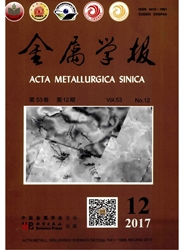

 中文摘要:
中文摘要:
基于前期工作对压缩孪晶静态再结晶的分析,主要利用XRD和EBSD技术进一步研究AZ31镁合金中拉伸孪晶静态再结晶过程中组织和织构的演变规律,以及再结晶初期新晶粒的取向特征,结果表明:拉伸孪晶不能有效地促进再结晶形核,其细化晶粒的效果不显著,其再结晶速率显著延迟于压缩孪晶;退火过程中并没有生成新的再结晶织构组分,表现为初始基面织构的减弱;新晶粒优先在拉伸孪晶的变体交叉处,或拉伸孪晶与压缩孪晶的交叉处形核,但其取向规律性不强,没有遵循初始拉伸或压缩孪晶内的取向规律,同时还对拉伸与压缩孪晶的再结晶行为进行了比较。
 英文摘要:
英文摘要:
Due to the poor plasticity of magnesium alloys at room temperature(about 15%), twinning plays an important role in the deformation of magnesium alloys,and twins will be the dominant recrystallization nucleation sites.There are at least two types of twinning in magnesium:the {10(?)2}-type tension twinning and the {10(?)1}-type compression twinning.Tension twinning proceeds much more easily than compression twinning since its volume fraction is much higher than that of compression twins,which may have a promotion effect on the recrystallization to a certain degree. Based on the previous research on the static recrystallization at compression twins,the evolution of microstructure and texture in AZ31 magnesium alloy during its static recystallization at tension twins was futher investigated;and the orientational characteristics of new grains formed at tension twins in the early stage of static recrystallization were analyzed by EBSD technique.The results showed that tension twins played only a subordinate role in recrystallization nucleation and suppressed recrystallization rate,thus failed to refine grain size effectively.The strong basal texture was retained and weakened with no new texture component being detected during annealing.New grains were observed to nucleate preferentially at the intersections of tension twin variants or the intersections between tension twins and compression twins.Their orientations were relative random and are strongly scattered from those of original tension twins or compression twins.A comparison of the recrystallization at tension twins and compression twins was made.
 同期刊论文项目
同期刊论文项目
 同项目期刊论文
同项目期刊论文
 期刊信息
期刊信息
